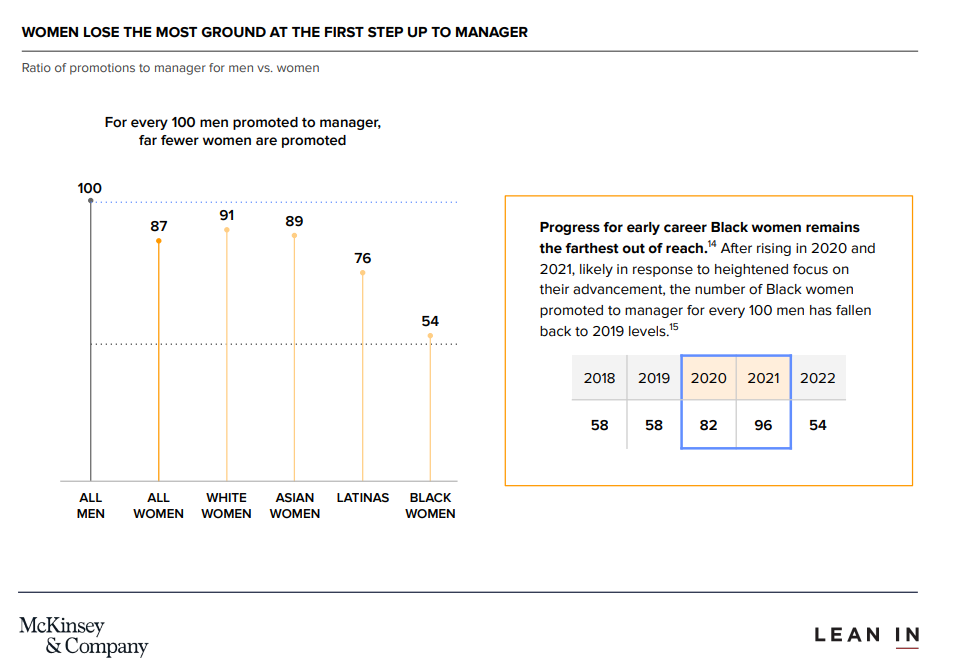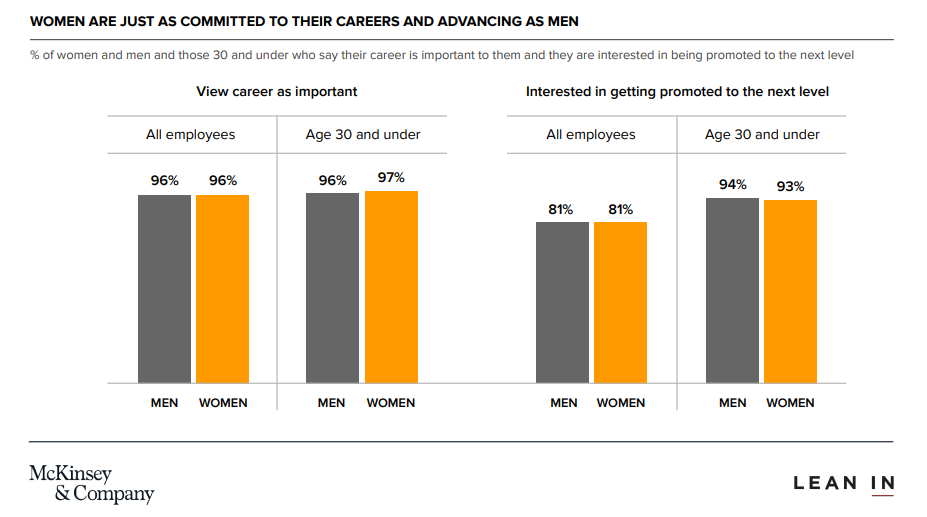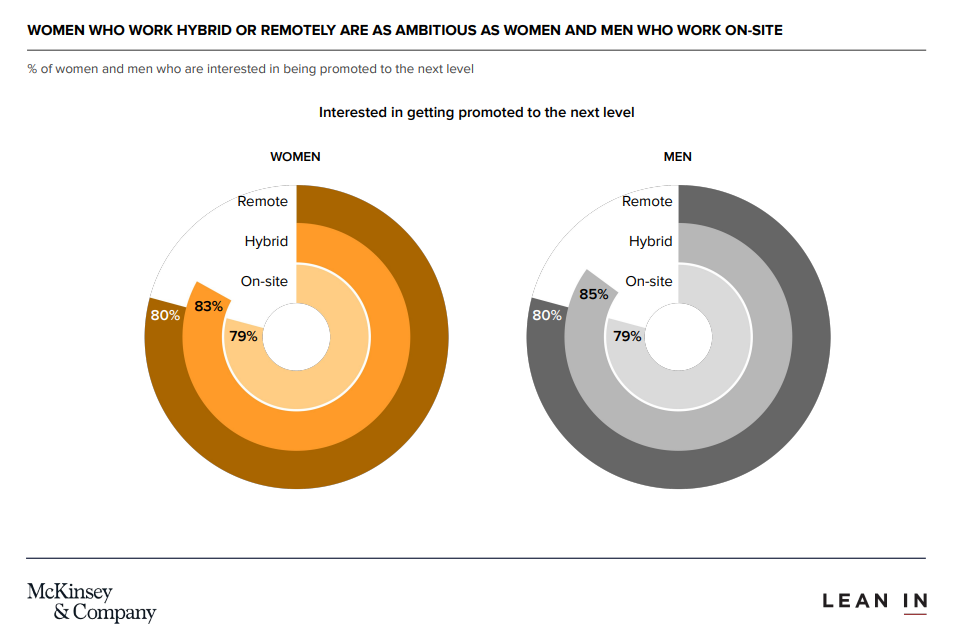
McKinsey report cites need to fix 'broken rung' for women further down the corporate ladder

A new report by McKinsey, Women in the Workplace 2023, has revealed that women are not in fact being blocked from C-suite roles by a “glass ceiling”, but by a “broken rung” much farther down the corporate ladder.
Men (60%) still significantly outnumber women (40%) in the management level of a typical company, the report revealed. This leaves fewer women to be promoted to director level, and less at each subsequent level.
“Until the broken rung is fixed, gender parity in senior leadership remains out of reach,” the report concluded. This means a reassessment by HR and organizations is necessary to address barriers women are encountering at the first levels of promotion to management.
The study, which was launched in 2015 by McKinsey and LeanIn.Org, collects annual data from over 900 companies and 450,000 people about workplace experiences.
This year, it was found that since 2015, the number of women at the C-suite level has increased from 17% to 28%. Women in VP and SVP roles have also increased. However, women at the director level (next in line for C-suite promotion) are leaving at increasing rates, more than their male counterparts. 
The biggest factor leading to the broken rung is the first level of promotion, where there is the widest gap, says McKinsey. This year, for every 100 men promoted from entry level to management, 87 women were promoted.
There were even less women of color promoted – 73 for every man promoted. This number has significantly decreased from last year, when 82 women of color were promoted from entry level for every 100 men.
“A lot of companies have leadership development programs, but by the time they decide to invest in the people, they've already lost a lot of them in the pipeline. So fixing that broken rung early is critical,” said Addie Swartz, CEO and founder of recruitment firm reacHIRE.
“You have to have access to people who look like you, that are at higher levels … you have to see what you can be so that you can be it. And so having access to those individuals who are role models is key. Having life-friendly HR policies is critical.”
Black women are promoted from entry level to management the least, the McKinsey study reported. After a brief spike in 2020 and 2021, in 2022 the number of Black women promoted to management was only 54 for every 100 men.
The study identified some main causes of the broken rung, including “performance bias”, whereby women tend to be promoted and hired based on what they have accomplished in the past, while men are promoted and hired based on what they can do in the future.
This bias, Swartz said, can be met head-on by HR by educating women on how to align and communicate their values in the workplace.

“Women are judged on what they have done, and men are judged on their potential, and I think that might be driven by how an individual shows up,” she said. “If we think that the most important thing is what we've learned and what we've done, not where the company's going, and where we could go with the company, then that is easy to for someone to be biased against that.”
Modeling for women how to build a pathway for their own strengths and expertise within a company’s vision is paramount for HR, Swartz said.
“That's how women need to show up. They need to be able to articulate, ‘What am I going to be able to do for the future, to propel the company forward?’”
The report pointed out that women are just as ambitious as men, and that flexibility and remote work are especially beneficial to the progress of their careers; one in five women said flexibility has allowed them to avoid reducing their hours or needing to leave their job altogether.
Women face less microaggression from coworkers and feel more psychologically safe when they are working remotely, the report said. Also, working remotely or hybrid helped them feel less burned out, as well as having more time to focus and get work done.
Both women and men listed “offering significant flexibility in when and where employees work” as one of the top factors in their company’s success.

The study revealed that microaggression has a heavy impact on women’s progress in the workplace, inhibiting their ability to rise through the ranks: “Years of data show that women experience microaggressions at a significantly higher rate than men,” the report stated. Women are twice as likely to be interrupted at work, and also to hear comments about their emotional state.
They are also three times as likely to think about quitting their jobs if they are experiencing microaggressions.
Women of color are even more subject to microaggressions, the report said – for example, Asian and Black women are seven times more likely to be mistaken for someone else of the same race or ethnicity than white women.
Further, 78% of women who experience microaggression at work “self-shield”, which means to change how they look or act to protect themselves, such as choosing to not voice opinions so they aren’t viewed as “difficult”.
“I think fostering a sense of belonging and building community within an organization is another key piece,” said Swartz. “Organizations need to do more earlier to invest in the people they've worked so hard to find, so that they thrive and grow. And I feel like women need more of that.”
Intersectional approaches can be used to track outcomes and other data; less than half of companies track for race and gender currently, and even less for self-identifying groups such as LGBTQ+. The career progression and outcomes of women and other marginalized groups can continue to be overlooked without added levels of detail to data tracking, the report stated.
Also recommended is an “often and varied” approach to training and upskilling of management, and the inclusion of DEI goals and markers in performance reviews.
For Swartz, it comes down to creating a support system for women to “create their own roadmap to success.”
“It's not about the women. It's not about their skills. It's about providing the right environment, providing the right support, and connections and peer community and safe space in order for them to kind of navigate their way,” she said. “You don't need to do that much investment. You just have to spend some time and energy to create experiences that they can grow in and grow from.”